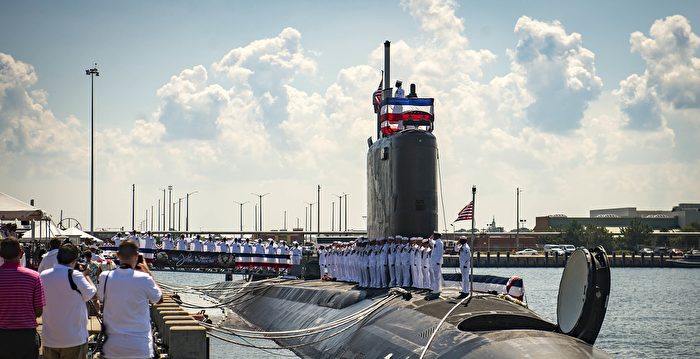Data map: On August 1, 2015, at the commissioning ceremony of the Virginia-class attack submarine USS John Warner (USS John Warner, SSN 785) held at Naval Station Norfolk (Naval Station Norfolk), sailors were working. (US Navy)
[The Epoch Times, March 10, 2023](Comprehensive report by Epoch Times reporter Li Yan) Australian defense officials and government advisers said that obtaining nuclear submarines is the key to Australia’s defense of its 36,000-kilometer coastline and maintaining its advantage against the Chinese Communist Party. China’s growing military presence means conflict can erupt without warning.
Reuters has previously reported that Australia is expected to buy up to five US Virginia-class submarines in the 2030s and then build a new British-designed submarine in South Australia under the AUKUS partnership. The US will pre-deploy a number of submarines in Western Australia around 2027.
Reuters reported on Friday (March 10) that Australian officials said upgrading from a diesel-electric fleet to nuclear-powered submarines gave Australia additional range, concealment and strike capabilities. Having these capabilities is critical given Australia’s reliance on trade in goods by sea, as well as telecommunications cables under the sea.
“This is the biggest step forward in our military capability since the end of World War II,” Australian Defense Minister Richard Marles said on Friday. “It’s bigger than anything we can do. Important, it will enable us to take care of ourselves in a rather difficult world.”
The three countries are expected to announce the details of the plan next Monday (March 13) in Santiago. The switch from six conventional submarines to a nuclear-powered fleet, with a price tag estimated at A$100 billion to A$170 billion ($66 billion to $112 billion), is Australia’s largest ever defense project.
Australia’s nuclear submarine will contain China’s expansion
Nuclear submarines are a key area where the US has an advantage over China’s navy, said Peter Dean, co-author of Australia’s National Defense Strategic Review. China has the largest navy in the world.
He said it was critical that Australia have sufficient capabilities to deter or, if necessary, engage China as it expands its nuclear submarine fleet and penetrates deep into Australia’s northern waters.
“The first thing a sub does is hunt other subs,” he said. “We need to be able to track these subs and respond appropriately if they do come into conflict with anyone. They are a real part of our deterrent capabilities.” important part.”
The National Defense Strategic Review was presented to the government last month and will be published in April.
A U.S. Department of Defense report last year said the Chinese military (PLAN) has 340 ships and submarines, including 12 nuclear-powered submarines, six of which are armed with ballistic missiles, and 44 conventionally powered submarines. The report also said that China will build a missile submarine by the middle of this decade.
Analysts say Australia could use superior technology to outwit China’s numerically superior fleet.
Bates Gill, executive director of the China Analysis Center at the Asia Society, said that Chinese submarines are less technologically advanced and noisy, making them easier to detect.
Michael Green, chief executive of the United States Studies Centre, wrote a paper on undersea warfare for the Pentagon seven years ago. The former National Security Council member said he estimated at the time that the U.S. was 15 years ahead of China in this area.
“The Chinese (China) are developing carrier-killer ballistic missiles that target surface ships, aircraft carriers and destroyers,” he said. It’s absolutely crucial.”
Green said Chinese military officials told him a decade ago that Beijing sought to control the waters around the Pacific “first island chain” consisting of Taiwan, Japan and the Philippines. These countries all have treaties or agreements with the United States to create a buffer zone.
They also want to push U.S. forces from the “second island chain” across the U.S. territory of Guam to the Pacific islands, which Australia has traditionally been an aid and security partner.
Green said the failure of China’s efforts to strike a 10-nation security and trade pact in the Pacific islands last year has once again drawn attention to Beijing’s naval ambitions.
“They want to bring the fighting to our perimeter so we can’t focus on contingencies on the first island chain,” Green said. He was referring to China’s escalating military provocations against Taiwan.
US and Australia deepen cooperation
Gill said the US had long wanted to base its nuclear submarines in Australia, and if that was the near-term solution under AUKUS, it would be a major shift.
He said AUKUS would also include joint development of long-range missile systems, pre-positioned materials and a larger US military footprint in Australia.
“Public attitudes towards China (the CCP) have changed dramatically,” he said. Australians see China as a threat, according to polling by the Lowy Institute think tank.
Prime Minister Anthony Albanese said Australia would retain sovereign decision-making power over the integration with the AUKUS allies, from workers building the submarines to training programs.
Albanese declined to comment to Reuters on the cost on Friday, but said Australia would “make sure we spend more on defence”.
Dean said the National Defense Strategic Review has developed a plan, from munitions and fuel logistics to workforce requirements and base location preparations, to deal with unexpected conflicts.
China says AUKUS violated the Pacific Nuclear Free Treaty and has sued the International Atomic Energy Association that the treaty is an act of nuclear proliferation. However, the International Atomic Energy Agency says nuclear propulsion projects at sea are allowed if they are supervised.
Responsible editor: Lin Yan#
